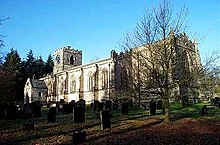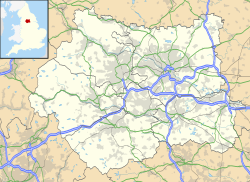All Saints' Church, Harewood
| All Saints' Church, Harewood | |
|---|---|

All Saints' Church, Harewood, from the southeast
|
|
| Coordinates: 53°54′01″N 1°31′26″W / 53.9003°N 1.5240°W | |
| OS grid reference | SE 313 450 |
| Location | Harewood, West Yorkshire |
| Country | England |
| Denomination | Anglican |
| Website | Churches Conservation Trust |
| Architecture | |
| Functional status | Redundant |
| Heritage designation | Grade I |
| Designated | 30 March 1966 |
| Architect(s) | Sir George Gilbert Scott (restoration) |
| Architectural type | Church |
| Style | Gothic |
| Groundbreaking | c. 1410 |
| Specifications | |
| Materials |
Millstone grit, Westmorland slate roofs |
All Saints' Church is a 15th-century redundant church in the park of Harewood House, the seat of the Earls of Harewood, near the village of Harewood, West Yorkshire, England. It is recorded in the National Heritage List for England as a designated Grade I listed building, and is under the care of the Churches Conservation Trust. The church stands in isolation within Harewood Park, as the surrounding village was relocated by the owner of Harewood House, in about 1760, to a location further from the house. Inside the church is a set of six alabaster monuments, that are "the largest collection of alabaster monuments in a parish church within the dates 1419–1510".
The present church was built in about 1410 by Elizabeth and Sybil, the daughters of William de Aldburgh of the nearby Harewood Castle, and was originally dedicated to the Holy Cross. It was not the first church on the site. There is a record of a priest here in the 10th century, and some carving from this period has survived. In 1739 the estate was acquired by the Lascelles family, who in later generations became the Earls of Harewood, and in 1759 they began the building of Harewood House. In the early 1780s the family added battlements and pinnacles to the church. It was restored in 1862–63 by Sir George Gilbert Scott. The restoration included replacement of the ceiling, the pews and the stained glass, and adding a new altar, lectern, pulpit and font. By 1978 the effigies on the alabaster monuments were deteriorating and when the church was taken into the care of the Churches Conservation Trust they were restored and repairs were carried out to the fabric of the church. All Saints was declared redundant on 1 November 1977, and was vested in the Trust on 24 October 1978.
...
Wikipedia

